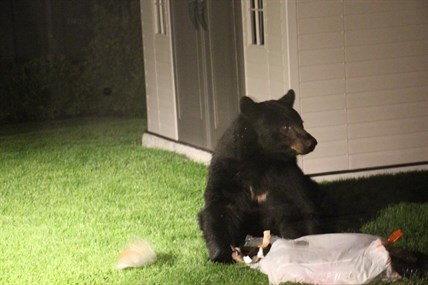
This bear stopped for a picnic in Aberdeen this weekend after finding some garbage left at an empty lot.
Image Credit: Venkat Geebu
September 03, 2014 - 8:32 AM
THOMPSON-OKANAGAN - Hide your picnic baskets and tuck away your garbage cans, it’s high season for bears as they look to take in about 20,000 calories per day before settling in to hibernate for the winter.
WildSafeBC Provincial Coordinator Frank Ritcey says bear sightings in the month of August were more than the four previous months combined in Kamloops while the number of sightings in other parts of the region are still ‘significant’.
“There’s a lot of garbage bears, a lot of fruit tree issues right now,” Ritcey says. “It’s real simple - put away your garbage and pick your fruit.”
In Kamloops, 97 bear sightings have been reported to the Wildlife Alert Reporting Program since Aug. 1 while the Kelowna and Vernon areas have seen about 40 reports each and the Penticton area about 20. In total, about 575 bear sightings have been reported in the region since April 1.
“There’s been a lot of activity… all over the place,” he notes. “It’s not fair to the bears, if they’re getting fed they’re going to keep coming around. It’s not good. Hopefully people will get the message.”
Ritcey says there used to be one person who would dump apples in the wooded portion of MacArthur Island Park in Kamloops and that now continues to be an area where the bears come to looking for food.
Birdfeeders are also an issue because one kilogram of sunflower seeds has about 8,000 calories while the same amount of huckleberries has only about 500 calories.
Ritcey recommends keeping an eye on the reporting program so you know when there have been sightings in your neighbourhood and if you do see a bear try to make a lot of noise, from a safe distance away, to scare them off.
“If you just leave him eating his meal then he’s feeling like ‘hey, I’m allowed to do this’,” Ritcey says. “Where as if you scare them and make lots of noise, bang pots and pans, then the bear says ‘this isn’t a good place to be, I’m leaving’ and will think twice about coming into a situation like that again.”
September and October are the busiest times of year for bear sightings because it is the time when bears have to put on a third of their body weight before hibernation. Luckily this also coincides with the salmon run, and Ritcey hopes many bears will turn to the rivers for food instead.
“It will be interesting to see what September holds for us,” Ritcey says. “I have a feeling it’s going to get busier before it slows down. Fall is the time of most conflict.”
People are asked to be vigilant in the coming months, to make sure they do not have any windfall from their fruit trees and to pick fruit before the bears get to it. Ritcey will also be talking to groups in Peachland and Clearwater about bear awareness programs and how to prevent human-bear interactions. In Kamloops, Ritcey says his crew will be working with bylaw officers to help get the word out about the bear bylaw, which states garbages cannot be put out before 4 a.m. on collection days from April through the end of November, and to ticket repeat offenders. Other communities rely on bear awareness to help educate people over how to prevent interactions, but few others have an actual bylaw in place to enforce those guidelines.
This year only three bears have been destroyed in Kamloops so far, down from the 15 or so killed last year. Typically five or six are killed every year once they become habituated to garbage and other food sources in residential areas.
Across the province more than 2,250 bear sightings have been reported just in the past month. In total calls for black bear sightings in the B.C. are up more than 1,700 year over year.
To contact a reporter for this story, email Jennifer Stahn at jstahn@infonews.ca or call 250-819-3723. To contact an editor, email mjones@infonews.ca or call 250-718-2724.
— This story was corrected at 9:28 a.m., Sept. 4, 2014 to remove reference to the Bear Aware program, which is no longer a standalone program.
News from © iNFOnews, 2014